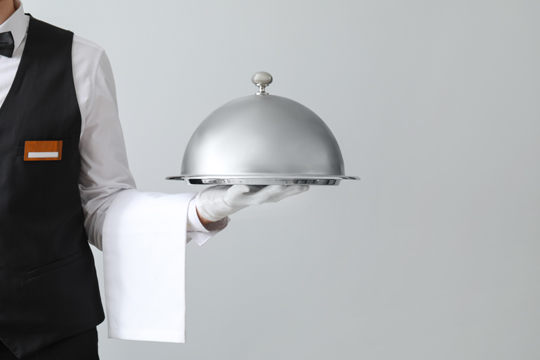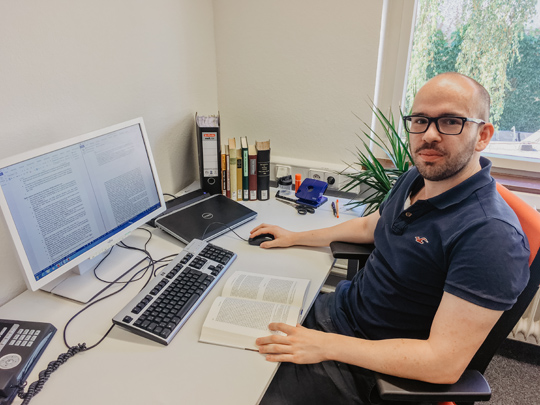A culinary time journey
Freiburg, Apr 14, 2020
The reports of German travelers and correspondents in Paris and London around 1800 show: The new phenomenon of the restaurant was not least a place of leisure. That is the conclusion of René Waßmer, literary researcher in the collaborative research center (SFB) 1015 Otium at the University of Freiburg. His study is now available in the collaborative research center’s online publication, “Muße. Ein Magazin”. Hans-Dieter Fronz spoke to René Wassmer about the term “restaurant,” among other things, and what it has to do with physical restoration.
 Restaurants in Paris are not only a place of culinary pleasure, but were in former times.also a place of leisure. Photo: Pixel-Shot/stock.adobe.com
Restaurants in Paris are not only a place of culinary pleasure, but were in former times.also a place of leisure. Photo: Pixel-Shot/stock.adobe.com
Mr. Waßmer, was Paris the culinary capital of Europe as early as 1800?
René Waßmer: The French city of Paris, along with the English city of London, was the capital of the culinary arts in Europe. That was connected with the political, economic and cultural significance of these two cities. Around 1800, they were the only two cities which today would be described as major urban centers. That was of course due to their centralist function in their respective countries. Ultimately, this created the chance for rich and varied food sales and the associated culinary culture to develop in both cities.
The notion of the ‘restaurant’ arose then too - what did it originally mean?
Physical restoration, that is expressed right there in the word. It’s interesting to note that the term originally referred to something like a strengthening soup or broth. There is the story that the first Paris restaurant owner wrote a quotation from Matthew over the door of his establishment: “Come to me, all you who are weary and burdened, and I will give you rest.” If you accept the legend - which is not supported by any sources - it really was originally about resting and restoring the strength of a hardworking subject. And that is the very point I take up in my article when I ask: Was that all? Or is there more to it?
You talk about the “new ways of eating and of gastronomy” which the early restaurants took. Evidently they went beyond the merely culinary and were places of “loose” society - and of leisure?
Yes, my theory is that restaurants were not purely culinary experiences; they also had other functions, they were there to serve an urban society. There was nothing quite like it in German cities. And that’s why it became an issue in the reports of travelers and letter-writers. For instance, when the writer Ernst Moritz Arndt went to these restaurants, the food was not the main thing for him. Rather, he was interested in the forms of social intercourse. It is very interesting how, in his work, he contrasts this urbane French sociability with backward German social forms.
 René Waßmer investigates German travel and correspondent reports from Paris and London around 1800, and his study ist now published in "Muße. A Magazine". Photo: private
René Waßmer investigates German travel and correspondent reports from Paris and London around 1800, and his study ist now published in "Muße. A Magazine". Photo: private
Where exactly is the leisure factor of a visit to a restaurant in Paris around 1800?
In a specific form of perception by a German observer, who is not himself involved in these urban processes. His experience of leisure is observing what is a foreign phenomenon in German eyes. Arndt sees this sociability itself as leisure. And to him, that means for the local patrons as well. When he says that the German traveler could learn something to benefit his own behavior and his own forms of sociability by observing Paris restaurants - that is exactly what we at the “Otium” collaborative research center consider to be otium or leisure - this idea of productive unproductivity.
Can a restaurant ensure leisure even today?
That depends on the respective conditions and reasons why you go to a restaurant. For instance, you can sit down in a restaurant and observe people there - promenading with your eyes, so to speak. But you can also go to a restaurant to simply consume something which will strengthen you. And a visit to a restaurant can also have a practical function, such as a business lunch, for example. A visit to a restaurant today has a potential variety just like I find in the texts I analyzed.
And is, or was, the restaurant also a stage for self-promotion?
Yes, for the city dwellers it was very much also about showing off their status. You can see that in the way contemporary German observers never tire of stressing the differences between the restaurants. They are a mirror of social inequality which is reflected just as well in the restaurants as in the perception of the German observers.
So is a restaurant a place in which both fine differences and less-fine phenomena are important?
What German visitors to Paris restaurants describe is a division of social layers - ultimately according to how much money you have, particularly in the more expensive restaurants. And you can still see that today.

